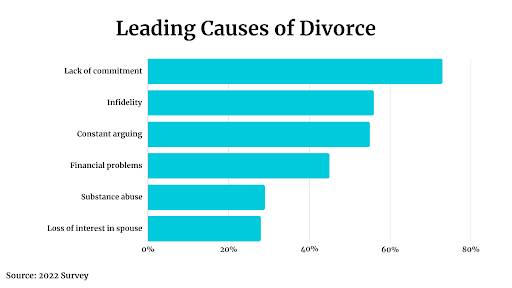Ending a marriage can be a difficult time. Given that 50% of marriages in the U.S. end in divorce, where finances often play a significant role. Divorce can have a significant impact on your financial situation. It’s important to approach the process with careful consideration and, if possible, seek professional advice to navigate the complexities involved.
This guide covers key aspects of financial planning during divorce to help you make informed decisions.

Understanding the Importance of Financial Planning During Divorce
Divorce brings significant life changes. Short-term and long-term financial stability can impact. Adjustments to budgets and financial plans may be necessary. Professional guidance can help navigate these changes. Financial planning helps you navigate these changes through
- Assess your altered finances by separating assets and incomes.
- Budgeting becomes essential to manage your new financial reality.
- Revise savings and investment goals to achieve future financial objectives.
- Strategic planning enables you to maintain your lifestyle as a single individual.
- Ensure your budget aligns with your long-term financial aspirations.
Careful financial planning is key to stability during this challenging transition.
The Role of Professionals in Divorce Financial Planning
Navigating the complex financial restructuring divorce requirements can be overwhelming without professional guidance. Seeking advice is essential for an optimal outcome.
Specialized professional divorce lawyer reno plays a crucial role in guiding individuals through the intricate process of divorce, offering a comprehensive range of services designed to address the multifaceted aspects of this challenging life transition. These legal experts are equipped with the knowledge and experience to provide financial analysis, future planning, legal expertise, and emotional support, ensuring that their clients navigate the complexities of divorce with confidence and clarity.
Seeking professional advice for the complex financial restructuring involved in a divorce is paramount to ensuring a fair and equitable resolution.
Key Professionals
Certified Divorce Financial Analyst (CDFA) –
Assists with financial data analysis and plans suitable settlement options.
Certified Financial Planner (CFP):
Experts in holistic financial planning, guiding budgeting, investing, retirement, and taxes.
Professionals provide financial clarity, help avoid debt, and offer critical emotional support.
Comparison of Key Services in Divorce Financial Planning:
| Service | What They Offer | Benefits |
| Certified Divorce Financial Analyst (CDFA) | – Financial data analysis – Evaluate settlement options – Tax expertise | – Optimize financial settlement – Future planning – Ensure adherence to laws/regulations |
| Certified Financial Planner (CFP) | – Comprehensive financial planning – Retirement/investment planning – Tax/insurance advice | – Long-term stability – Achieve future goals – Maintain lifestyle |
| Divorce Lawyer | – Asset division expertise – Child/spousal support guidance – Legal documentation | – Fair asset split – Determine support levels – Ensure legal compliance |
| Accountant | – Tax advice/preparation – Financial documentation – Record keeping | – Tax savings – Full financial disclosure – Accuracy for analysis |
Gathering Essential Financial Information
To plan, you must gather current detailed records of all assets, debts, incomes, and expenses.
- Bank, investment, and retirement accounts
- Mortgage, loan, and credit card statements
- Tax returns
- Insurance policies
- Budget spreadsheets
Compiling this ensures:
Full financial disclosure: Essential for mediation and negotiations.
Accuracy: Allows proper analysis to build future financial plans.
Complete information enables strategic planning suitable to your situation.
Steps in the Divorce Financial Planning Process
In the United States, approximately 690,000 divorces were registered, with a divorce rate of 2.5 per 1,000 of the population. With all documentation gathered, the financial planning process can begin:
- CDFA and CFP assess total net worth by collating assets vs. liabilities with supporting documents.
- Analyze spending using bank/credit card statements to prepare an expense forecast budget.
- Review current and projected incomes, including employment, spousal/child support, and investments.
- Estimate post-divorce budgets with the advisor to plan for the cost of living in separate households.
- Research settlement options for expert guidance on short and long-term tax, budget, and cash flow impacts.
- Discuss asset division, ensure adherence to state laws, and achieve a fair split of all assets with a lawyer.
- Address shared debts: Agree on repaying outstanding mortgages, loans, credit cards, etc.
- Update estate planning: Revise beneficiaries on insurance policies, wills, trusts, etc. per situation.
- Review insurances: Assess health, life, and disability plans needed post-divorce.
- Build or revise your financial plan by incorporating projections and professional inputs. Include concrete action steps for a comprehensive long-term financial strategy.
Strategic planning ensures financial security post-divorce.
Special Considerations in Divorce Financial Planning:
Child support: Determining suitable support levels and payment mechanisms.
Alimony: Calculating amount based on length of marriage, income levels, and living standards.
Asset division: Ensuring a fair allocation with local regulations.
Seek expert guidance for your situation to understand child support. Alimony, assets, and proper financial disclosure, as it is vital.
FAQs:
Q: How do courts and lawyers determine alimony?
They consider factors such as the duration of your marriage, the disparity in your current and future earnings, and your age and health. The aim is to let both people keep a lifestyle close to before the divorce.
Q: What are the most important money steps when preparing for a divorce?
Talk to financial specialists like CDFA to guide you through the process. Gather bank statements detailing assets, debts, earnings, and spending.
Q: How can I protect my financial interests during a divorce?
Create new budgets to understand your financial situation post-divorce. Protect your money interests by setting up trusts and ensuring enough savings. Document dealings with shared money and assets for clarity. Work with an experienced divorce financial advisor for expert guidance.
Conclusion
Going through a divorce brings big changes to your money situation. Having a good handle on your finances makes this tricky time much easier.
Talking to financial experts helps you get organized. They can look at bank statements, bills, incomes, expenses, and more to see where you stand. Then they help you make budgets and plans for the future.
It’s key to know the rules on child support, alimony for ex-spouses, and splitting stuff you own. These experts guide you on what is both fair and legally mandated.
Seeking professional advice empowers you to take control of your new financial life. With the right guidance and information, you can make choices that align with your needs.





























